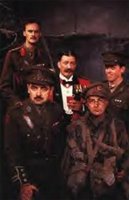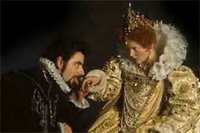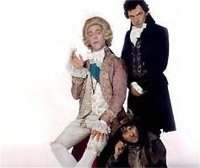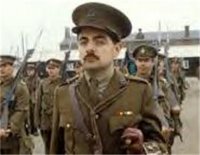 The sound of hoofbeats 'cross the glade,
The sound of hoofbeats 'cross the glade,Good folk, lock up your son and daughter,
Beware the deadly flashing blade,
Unless you want to end up shorter.
Black Adder, Black Adder, he rides a pitch black steed.
Black Adder, Black Adder, he's very bad indeed.
Black: his gloves of finest mole,
Black: his codpiece made of metal,
His horse is blacker than a hole,
His pot is blacker than his kettle.
Black Adder, Black Adder, with many a cunning plan.
Black Adder, Black Adder, you horrid little man.
This show is one of my all time favorites and by far my favorite British comedy series. It takes us on a rather unusual trip through British history.
Although each series is set in a different historical period, all follow the fortunes (or, rather, misfortunes) of Edmund Blackadder (played by Atkinson), who in each is a member of an English family dynasty present at many significant periods and places in British history.
Although his intelligence levels rise over the course of the series (the character starts as being quite unintelligent in the first and gradually becomes smarter through each passing generation), each Blackadder is similar in that they are all cynical, cowardly opportunists concerned with maintaining and increasing their own status and fortunes in life, regardless of their surroundings. Also, each Blackadder's social status becomes lower, even though Blackadder's intellect increases. The lives of each man are also entwined with their servants, all called Baldrick (played by Robinson), who in each generation acts as the dogsbody/punching-bag of the various Blackadders, and who decreases in intelligence (and in personal hygiene standards). Blackadder and Baldrick are also saddled with the company of a dim-witted aristocrat - Lord Percy Percy (Tim McInnerny) in the first two seasons, George (Hugh Laurie) in the third and fourth - whose presence he must somehow tolerate.
Each series was set in a different period of British history, beginning in 1485 and ending in 1917 (with one special set on New Year's Eve 1999) comprising six half-hour episodes. The first series, made in 1983, was called The Black Adder. This was followed by Blackadder II in 1986, Blackadder the Third in 1987, and finally Blackadder Goes Forth in 1989. In addition to these, three specials were also made: "Blackadder: The Cavalier Years" appeared as a 15-minute insert during the 1988 Comic Relief telethon; Blackadder's Christmas Carol was a 45-minute Christmas installment, broadcast the same year; and Blackadder: Back & Forth was a 30-minute film originally shown in a special cinema at the Millennium Dome throughout 2000, and later transmitted by Sky and the BBC. A pilot episode was filmed in 1982, but has never been shown on television. Featuring a different actor as Baldrick, the plot would be re-used for the episode "Born to Be King" in series 1. Although DVD releases never include the pilot episode (Atkinson specifically prevents it from being distributed, because he fears it will overshadow his acting skills), copies are known to circulate among fans.
It is implied in each series that the Blackadder character is a distant descendant of the previous one.

The first series, written by Curtis and Atkinson and without the involvement of Ben Elton, is the most different from the three others. It is noticeable that, as Blackadder is more cunning in series two, so Baldrick develops even further into a dimwit. It is clear that in the first series, the latter is smarter than his superior, saving the day on several occasions, whereas Edmund is despised by all and never accomplishes a thing. With each observed generation, his social standing is reduced, from prince, to nobleman, to royal butler, before he moves upward to regular army captain in Blackadder Goes Forth and King of modern Britain in "Back and Forth". However, he concurrently goes from being an incompetent fool (in the first series) to an ever more devious strategist in matters that affect him. The Macbeth-inspired witches, in "The Foretelling" (thinking he is, in fact, Henry Tudor), promise that one day Blackadder will be king and, in "Bells" the 'wise woman' says "thou plottest Blackadder: thou wouldst be King!" In the first series, Edmund does become king for less than a minute, but then dies after succumbing to some poisoned wine.

In the second series, Blackadder comes very close to marrying Elizabeth I but fails. At the end of Blackadder the Third, the character assumes the role of Prince Regent after the real prince is killed in a duel with the Duke of Wellington, and (presumably, though not definitely) goes on to assume the identity of George IV. After his general decline in status through the series, Blackadder, or at least the descendant of the original, finally becomes absolute monarch in Blackadder: Back & FoBlackadder the Third is set in the late 18th and early 19th centuries, a period known as the Regency. For much of this time, King George III was incapacitated due to poor mental health, and his son George, the Prince of Wales, acted as regent. From 1811 until his father's death in 1820, he was known as "the Prince Regent".
In the third series, E. Blackadder Esquire is the butler to the Prince of Wales (the prince is played by Hugh Laurie as a complete fop and idiot). Despite Edmund's respected intelligence and abilities, he has no personal fortune to speak of. According to Edmund he has been serving the Prince Regent all their lives, since they were both breastfeeding (when he had to show the Prince which part of his mo
 ther was serving the drinks).
ther was serving the drinks).The fourth series, interestingly enough titled Black Adder Goes Forth is set in 1917, on the Western Front in the trenches of the First World War. Another "big push" is planned, and Captain Blackadder's one goal is to avoid getting shot, so he plots ways to get out of it. Blackadder is joined by the idealistic Edwardian twit Lieutenant George (Hugh Laurie), and the world's worst cook, Private S. Baldrick. The first initial "S" is taken from the first episode of Season 3, in which Baldrick says he can't remember his first name, but assumes it must be "Sodoff", as when he introduces himself to people, they generally say, 'yes, we know: Sod off, Baldrick'.

Loony General Melchett rallies his troops from a French mansion thirty-five miles from the front, where he is aided and abetted by his assistant, Captain Darling (Tim McInnerny), pencil-pusher supreme and Blackadder's nemesis, whose name is played on for maximum comedy value. Every episode's title is based on the pairing of a military rank, major, general, etc., and another word.
There were several specials filmed after the series ended. Black Adder's Christmas Carol and Black Adder: Back & Forth are available on video.
Some that are difficult to find are Black Adder The Cavalier Years, The Woman's Hour Invasion, Black Adder: The Army Years and The Jubilee Girl, a tribute to HRM.
I can watch this series over and over and still get a kick out of it.
3 comments:
golden goose
kd shoes
kyrie 7
yeezy 350
curry 6
golden goose
supreme clothing
kyrie 6
off white
supreme
why not try these out bag replica high quality you can try these out replica gucci bags visit this site Ysl replica bags
moncler
yeezy 350
golden goose slide
supreme clothing
air jordan
hermes handbags
kyrie irving shoes
off white
giannis shoes
nike kyrie 5
Post a Comment